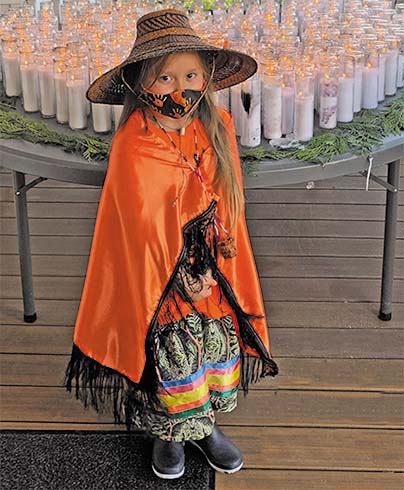Remembering the lost lives of Indian residential boarding schools
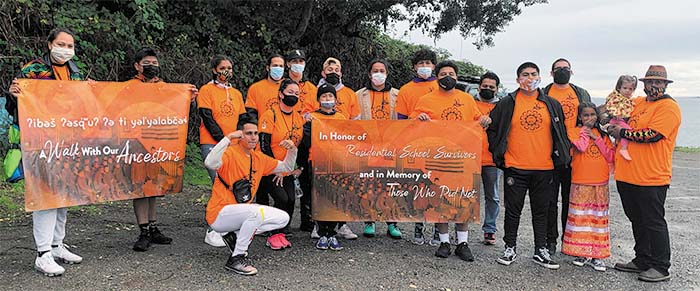
By Shaelyn Hood, Tulalip News
With the recent discovery of over 6,000 Indigenous unmarked graves, the world is finally paying closer attention to the history of Indian Residential Schools in Canada and the US, and the many innocent lives that were lost.
During the 19th to mid-20th century, Canada, the United States of America, and various Christian missionaries established Indian Residential Schools. This system was created to “civilize” and assimilate Indigenous youth to a more European-American culture. Often, tribal members were not willing to submit to these efforts, and schools started forcibly removing children from their homes. Along with major efforts to disintegrate Native American spirituality, and overall culture, Indigenous people had their hair violently cut off, were punished for speaking their language, using their tribal names, and forced to wear European-American style uniforms. Indigenous youth underwent decades of abuse, and often lost their lives.
Canada became the first to acknowledge and mark its first official National Day for Truth and Reconciliation on September 30th. However, even though the history of residential schools were just as prominent in the US, they have yet to follow suit, and acknowledge the years of dismemberment of Native American tribes.
Tulalip Tribes passed a resolution and decided to move forward, declaring Orange Shirt Day – A day of Awareness & Remembrance for Residential Boarding Schools. On September 30th, 2021, the Tulalip Tribes Education Division put on the first annual Orange Shirt Day.
Jessica Bustad, Executive Director of Education, spoke about what this day meant to her and what she was hoping to accomplish, “This day means the start of something bigger, the start of healing for our community, for our people, for Indigenous people across North America, Canada, and everyone who has experienced residential boarding schools, colonialism, and genocide.”
“It’s kind of overwhelming. I couldn’t talk about the event for a while without crying,” she contiunued. “I don’t feel like we were really the ones to put out this event. The event was already laid out by our ancestors, and we are just here to do the footwork for them. But this is long overdue, and it’s time to start bringing out the truth of what happened here so we can start to get to that place of healing as a community.”
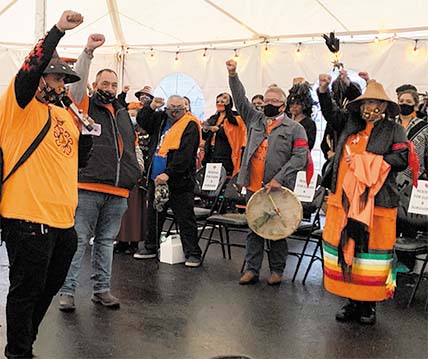
The night’s festivities started with a youth prayer and run, that began at Mission Beach and ended 1.7 miles away, at the Dining Hall. As many tribal members know, the Dining Hall holds the last remaining remnants of a residential school located on Tulalip. Kaiser Moses who was one of the participating runners, and the elected chairperson of the Senior Tulalip Youth Council, said, “Even though I was never in a boarding school and my parents weren’t in a boarding school, it still has impacts on our elders and our current generation. When I run, I run to clear my mind, to get things off my chest, and to leave things behind me. So, when I was running, I was thinking about that.”
Once the runners made it to the Dining Hall, Tribal members gathered, and discussed the evening, while looking over old photographs of their ancestors in the boarding schools, and the candles that represented their lost lives. Orange Shirts and meal boxes were also distributed to everyone that attended.
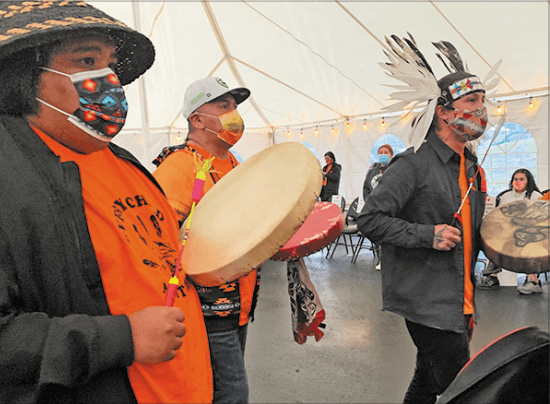
Natosha Gobin and the Lushootsheed youth – otherwise known as the Language Warriors, performed an opening prayer. It was an amazing way to commemorate the language Native Americans fought so hard to keep alive.
Following, opening words came from members of the Board of Directors. They all spoke of the grief they were feeling and the pain they know our tribe and many others were going through. Tulalip Tribes Chairwoman, Teri Gobin, shared how her father was a member of the schools and hospitals, “The historical trauma lives on, you could see it in my dad.” She sympathized with other tribal members feeling that same pain, and expressed how it deserves to be recognized. “I’m glad that we’re looking at legislation that’s going to be coming forward, that’s going to help do the investigation and find out what happened to our loved ones and to bring them back to their families and to their homelands. But it just touches me. We haven’t gotten the apologies from the government like they did in Canada. We haven’t got them from the churches on what they did to our people.”
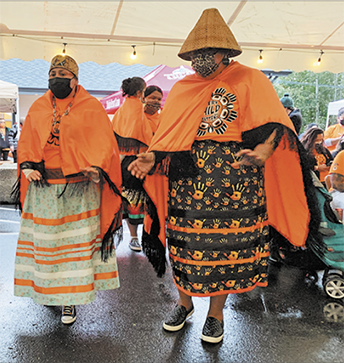
On September 24, 2021, Canadian Catholic bishops released a public apology for residential schools. The Native Women’s Association of Canada called upon the Premiers of all provinces and territories to recognize the National Day for Truth and Reconciliation. Marysville School District, which holds a lot of native children, also released a proclamation to observe “Orange Shirt Day” in remembering the children who died in the Residential Boarding School System.
Youth and Family Enrichment Manager, Josh Fryberg, followed with, “Tribes need to follow and do the same thing. Pass this resolution to honor our survivors, to honor our kids that never made it home. To create that healing the best way possible for the future generations”.
After hearing from the attending Board of Directors, the night continued with various traditional tribal prayers, drums, songs, and dances. Tribal members spoke of this opportunity, and how our ancestors didn’t have that same privilege during the days of residential schools. One of the songs was a Snohomish War Song, where the elders were sat in the middle, and performers danced around them and sang to protect them. Tony Hatch spoke of his gratefulness that the elders had joined the event, and reminded them that if anyone has any scars, all of Tulalip is here for them, and behind them.
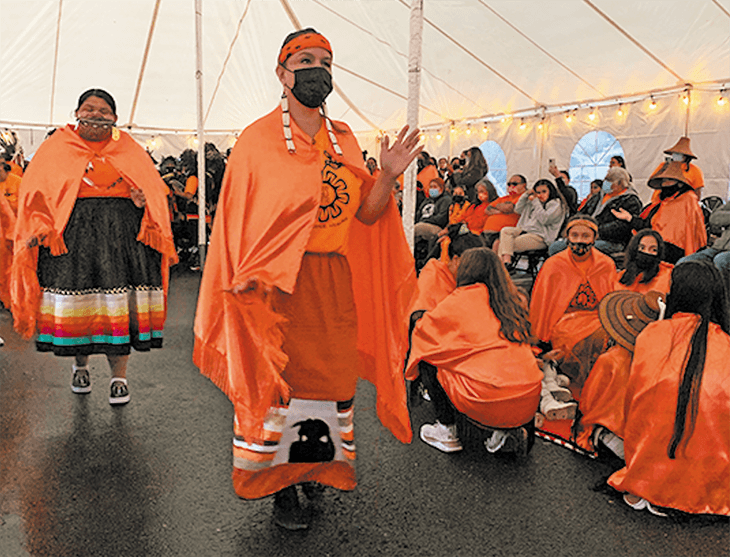
After hearing from the attending Board of Directors, the night continued with various traditional tribal prayers, drums, songs, and dances. Tribal members spoke of this opportunity, and how our ancestors didn’t have that same privilege during the days of residential schools. One of the songs was a Snohomish War Song, where the elders were sat in the middle, and performers danced around them and sang to protect them. Tony Hatch spoke of his gratefulness that the elders had joined the event, and reminded them that if anyone has any scars, all of Tulalip is here for them, and behind them.
Though many tribal elders were not able to make it to the event, others that were in attendance were given the opportunity to speak to the tribal community. Some passed along stories of loved ones that were affected, some expressed gratefulness towards our leaders, and others shared wisdom from their experiences, and what they want for the community. Overall, each speaker spoke of the pain that they felt for our community and the hopes for the future.
Ray Fryberg was one of the speakers. He told stories of how our culture has been mistreated by outsiders through the years and how we can once again become whole. “Teaching language and being able to teach things in our culture that they took away from us, those are the things that are going to heal us. The things that we lost. These are the things that we regain, and that help build self-respect through self-identity, and our own cultural values and our own cultural teachings. To be good to one another. Culture means, how do we take care of each other? One person at a time, that makes up the tribe, and that’s how we move forward. Taking care of ourselves and exercising our sovereignty”.
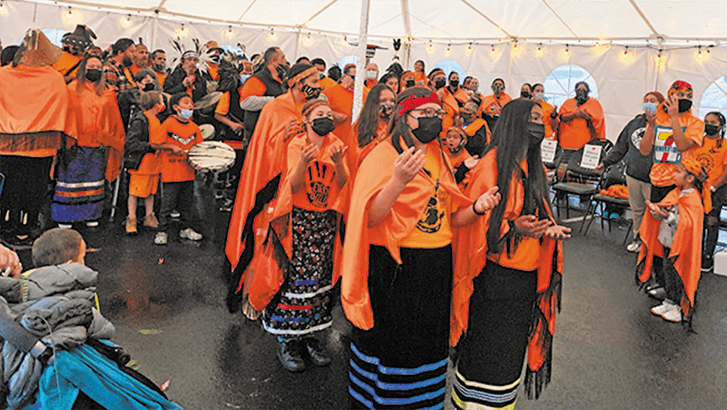
The event paid a special tribute to Tulalip, Native American Activist, Deborah Parker. She was a speaker that was unfortunately not able to make it that night. Members spoke highly of her efforts to working towards legislative reform. They spoke of the platform she has made for Native American voices and how she has become a strong representative of Tulalip Tribes. Many were praying for her and were grateful for her tireless endeavors to lift Native culture.
Towards the end of the night, the community heard from two residential boarding school survivors. Each shared the horrors of what the schools and hospitals held. They also talked about how it affected them mentally for the years following, and the demons that haunted them in adulthood.
Wayne Williams was one of these survivors. He talked about the irony of the title, “National Day for Truth and Reconciliation,” and he quoted something so profound, “there can’t be reconciliation for a relationship that did not exist. This relationship with all the people that forced us into the boarding schools didn’t exist. Because we didn’t choose it. We didn’t choose it”.
The night concluded with a Costal Jam, with spirited songs, drums, and dance.
For many Indigenous people, this is a difficult time. We grieve the loss of our ancestors and mourn over the endless pain that they had to endure. Very few survivors are still alive to tell their stories and about the tragedies that took place at residential boarding schools. But tribal members can always find support in our community.
As Jessica Bustad said, “we see you, we feel you, and we’re here for you. We’re all on this journey together, and we will continue to be on this journey together.” And for any tribal youth that are still trying to understand this day, “Learn your history, understand your history, your family roots, and honor your ancestors. It’s going to be such an emotional time. Take care of yourselves, take care of your families, and do what you need to do to heal”.
